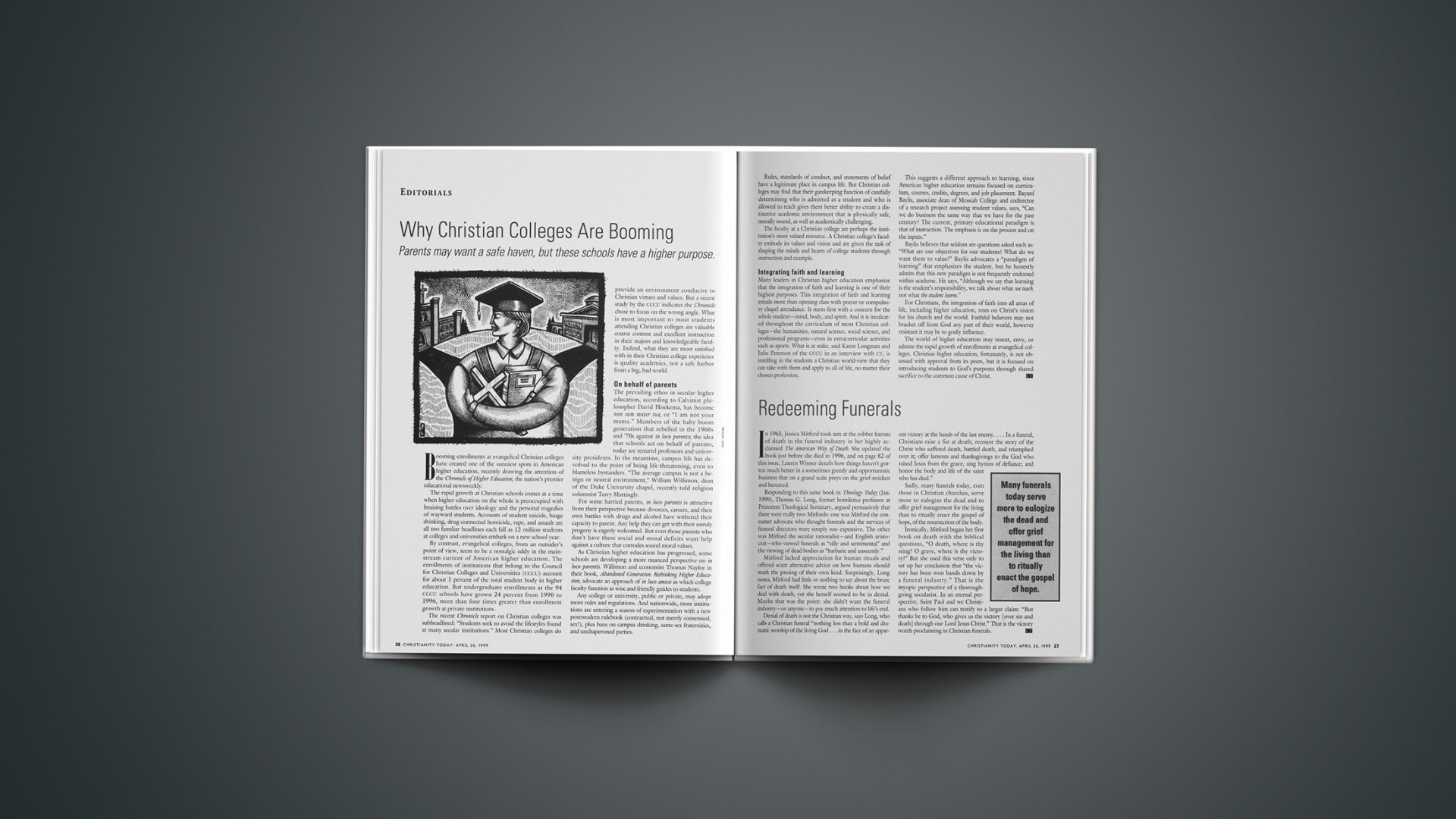Booming enrollments at evangelical Christian colleges have created one of the sunniest spots in American higher education, recently drawing the attention of the Chronicle of Higher Education, the nation’s premier educational newsweekly.
The rapid growth at Christian schools comes at a time when higher education on the whole is preoccupied with bruising battles over ideology and the personal tragedies of wayward students. Accounts of student suicide, binge drinking, drug-connected homicide, rape, and assault are all too familiar headlines each fall as 12 million students at colleges and universities embark on a new school year.
By contrast, evangelical colleges, from an outsider’s point of view, seem to be a nostalgic eddy in the mainstream current of American higher education. The enrollments of institutions that belong to the Council for Christian Colleges and Universities (CCCU) account for about 1 percent of the total student body in higher education. But undergraduate enrollments at the 94 CCCU schools have grown 24 percent from 1990 to 1996, more than four times greater than enrollment growth at private institutions.
The recent Chronicle report on Christian colleges was subheadlined: “Students seek to avoid the lifestyles found at many secular institutions.” Most Christian colleges do provide an environment conducive to Christian virtues and values. But a recent study by the CCCU indicates the Chronicle chose to focus on the wrong angle. What is most important to most students attending Christian colleges are valuable course content and excellent instruction in their majors and knowledgeable faculty. Indeed, what they are most satisfied with in their Christian college experience is quality academics, not a safe harbor from a big, bad world.
On behalf of parents
The prevailing ethos in secular higher education, according to Calvinist philosopher David Hoekema, has become non sum mater tua, or “I am not your mama.” Members of the baby boom generation that rebelled in the 1960s and ’70s against in loco parentis, the idea that schools act on behalf of parents, today are tenured professors and university presidents. In the meantime, campus life has devolved to the point of being life-threatening, even to blameless bystanders. “The average campus is not a benign or neutral environment,” William Willimon, dean of the Duke University chapel, recently told religion columnist Terry Mattingly.
For some harried parents, in loco parentis is attractive from their perspective because divorces, careers, and their own battles with drugs and alcohol have withered their capacity to parent. Any help they can get with their unruly progeny is eagerly welcomed. But even those parents who don’t have these social and moral deficits want help against a culture that corrodes sound moral values.
As Christian higher education has progressed, some schools are developing a more nuanced perspective on in loco parentis. Willimon and economist Thomas Naylor in their book, Abandoned Generation: Rethinking Higher Education, advocate an approach of in loco amicis in which college faculty function as wise and friendly guides to students.
Any college or university, public or private, may adopt more rules and regulations. And nationwide, more institutions are entering a season of experimentation with a new postmodern rulebook (contractual, not merely consensual, sex!), plus bans on campus drinking, same-sex fraternities, and unchaperoned parties.
Rules, standards of conduct, and statements of belief have a legitimate place in campus life. But Christian colleges may find that their gatekeeping function of carefully determining who is admitted as a student and who is allowed to teach gives them better ability to create a distinctive academic environment that is physically safe, morally sound, as well as academically challenging.
The faculty at a Christian college is perhaps the institution’s most valued resource. A Christian college’s faculty embodies its values and vision and is given the task of shaping the minds and hearts of college students through instruction and example.
Integrating faith and learning
Many leaders in Christian higher education emphasize that the integration of faith and learning is one of their highest purposes. This integration of faith and learning entails more than opening class with prayer or compulsory chapel attendance. It starts first with a concern for the whole student—mind, body, and spirit. And it is inculcated throughout the curriculum of most Christian colleges—the humanities, natural science, social science, and professional programs—even in extracurricular activities such as sports. What is at stake, said Karen Longman and Julie Peterson of the CCCU in an interview with CT, is instilling in the students a Christian world-view that they can take with them and apply to all of life, no matter their chosen profession.
This suggests a different approach to learning, since American higher education remains focused on curriculum, courses, credits, degrees, and job placement. Bayard Baylis, associate dean of Messiah College and codirector of a research project assessing student values, says, “Can we do business the same way that we have for the past century? The current, primary educational paradigm is that of instruction. The emphasis is on the process and on the inputs.”
Baylis believes that seldom are questions asked such as: “What are our objectives for our students? What do we want them to value?” Baylis advocates a “paradigm of learning” that emphasizes the student, but he honestly admits that this new paradigm is not frequently endorsed within academe. He says, “Although we say that learning is the student’s responsibility, we talk about what we teach, not what the student learns.”
For Christians, the integration of faith into all areas of life, including higher education, rests on Christ’s vision for his church and the world. Faithful believers may not bracket off from God any part of their world, however resistant it may be to godly influence.
The world of higher education may resent, envy, or admire the rapid growth of enrollments at evangelical colleges. Christian higher education, fortunately, is not obsessed with approval from its peers, but it is focused on introducing students to God’s purposes through shared sacrifice to the common cause of Christ.
Copyright © 1999 Christianity Today. Click for reprint information.










